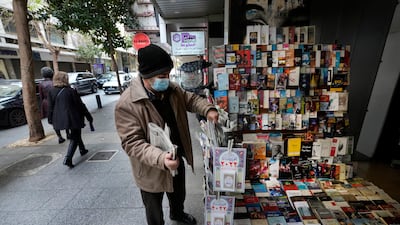Business conditions in Lebanon’s private sector continued to deteriorate in December, falling to an 11-month low as new orders and output declined amid higher inflation, rising operating costs and political uncertainty.
The Blom Lebanon Purchasing Managers’ Index (PMI) reading dropped to 47.3 in December, from 48.1 in November, marking the fastest deterioration in private sector operating conditions in the country since January.
A reading above the neutral level of 50 indicates growth while lower numbers indicate contraction.
“The harsh decline in business activities is certainly driven by an eroded purchasing power of the Lebanese people and adversely weaker domestic demand,” said Aline Azzi, research analyst at Blominvest Bank.
“Constant disappointment on the political front also prevails. Failure to elect a new head of state for more than 10 attempts coupled with a larger trade deficit is taking its toll on the Lebanese economic situation.”
The devaluation of the Lebanese pound is also one of the reasons for the deterioration of private sector business conditions in the country, she said.
Lebanon, in the grip of its worst economic crisis in decades, continues to suffer from hyperinflation, which hit 142.4 per cent in November compared with the same month a year earlier.
Politicians are deadlocked over the formation of a new cabinet seven months after parliamentary elections were held and after the six-year term of former president Michel Aoun expired at the end of October.
In September, the International Monetary Fund called on Lebanese authorities to put in place critical structural and financial reforms, a prerequisite to securing $3 billion of assistance from the lender that is expected to help the country emerge from the economic crisis.
Securing IMF backing would help to unlock a further $11 billion of assistance that was pledged at a Paris donor conference in 2018, which is also tied to a number of reforms.
New orders declined at the quickest pace in nine months in December amid lower demand, the latest PMI survey results show. Overall employment levels in the country also fell as private-sector companies reduced their activity.
Input costs, meanwhile, rose at the end of the year as a result of the high cost of the US dollar that has pushed up the price of purchased items. Input costs, however, slowed to a five-month low, the survey results show.
“Concerns would stay on the horizon as the country seems to be paralysed by multiple regional and domestic developments and far from any socio-economic stability,” Ms Azzi said.
“We only hope that this 'grey period' does not stay long, given the severity of the economic situation.”
Lebanon’s economy collapsed after it defaulted on Eurobonds worth about $31 billion in March 2020, with its currency sinking more than 90 per cent against the dollar on the black market.


